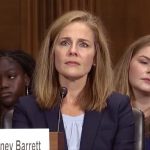Rick Perry provoked the ire of secularists when he invited the nation’s governors to join him at “The Response,” a Christian prayer gathering that drew 30,000 sojourners to Houston’s Reliant Stadium last weekend. “Father, our heart breaks for America,” the Texas Governor reportedly prayed during the event. “We see discord at home. We see fear in the marketplace. We see anger in the halls of government. And as a nation we have forgotten Who made us, Who protects us, Who blesses us, and for that we cry out for Your forgiveness.”
Predictably, Perry’s involvement elicited a wave of allegations that he had breached the constitutional wall separating church and state. Yet the separating line has always been a bit fuzzy (especially when “church” is taken to include religious or theological sentiments and practices in addition to ecclesiastical offices), and American statesmen have long insisted that a religious basis for public morality is necessary for the maintenance of free government.
During his Farewell Address, George Washington suggested that “religion and morality” were the “indispensable supports” of political prosperity, and he warned that the new nation should “with caution indulge the supposition that morality can be maintained without religion.”
During the Quasi-War with France, Washington’s successor, John Adams, asserted that “social happiness cannot exist, nor the blessings of a free government be enjoyed” absent a widespread public morality rooted in religious conviction. For the promotion of this public morality, the second president proclaimed a “day of Solemn Humiliation, Fasting and Prayer,” urging Americans to beseech God “through the Redeemer of the world, freely to remit all our offences, and to incline us, by his holy spirit to that sincere repentance and reformation which may afford us reason to hope for his estimable favor and heavenly benediction.”
Start your day with Public Discourse
Sign up and get our daily essays sent straight to your inbox.There is also the notable example of Abraham Lincoln, who, at the request of both houses of Congress, in the midst of civil war, declared it “fit and becoming of all people, at all times, to acknowledge and revere the Supreme Government of God” and to “bow in humble submission to his chastisements; to confess and deplore their transgressions in the full conviction that the fear of the Lord is the beginning of wisdom; and to pray, with all fervency and contrition, for the pardon of their past offenses, and for a blessing upon their present and prospective action.”
In eighteenth- and nineteenth-century America, politicians often emphasized the role of religion in promoting good government (rather than vice versa), and civically-minded religious proclamations served a broad political function at a time when the President could declare, without hyperbole, that Americans in the north and south “read the same Bible and pray to the same God.” The aim of a national declaration of prayer and fasting, in this context, was to bind the nation together, across denominational and party lines, in mutual affirmation of God’s authority and providence. Proclamations such as Lincoln’s were thus mindful of religious differences, imploring “all ministers and teachers of religion of all denominations” and “all heads of families, to observe and keep that day according to their several creeds and modes of worship.”
Today, we do not all read the same Bible and pray to the same God, and the political upshot of “The Response” (if there is one) will probably be Governor Perry’s endearment to a set of evangelical voters. Of course, there is nothing wrong with this, as far as it goes. There are worse things than 30,000 people praying together for the health of the nation, and Perry is free to initiate and promote such an event. However, alliances between politicians and particular religious communities do not always redound to the benefit of the faithful. As even impious politicians have discovered, religion can be a useful political tool (and not always as an instrument of national cohesion).
Earlier generations thought that the real boon of religion to self-government was its general promotion of morality—or what we now prefer to call ethics—in the polity. In our current state of affairs, the ethical principles that make republican politics possible have to be affirmed by citizens of different faiths, and whatever public theology we promote must therefore exist at a certain level of abstraction. This is, in part, the genius of what many have dubbed the American Creed—the theoretical foundation of American government sketched briefly in the preamble to the Declaration of Independence.
“We hold these truths to be self-evident,” the familiar words of the Declaration ring out, “that all men are created equal, that they are endowed by their Creator with certain inalienable Rights, that among these are Life, Liberty, and the Pursuit of Happiness.” In the Declaration, these principles were not so much argued for as asserted, and as historian Thomas Kidd recently wrote in USA Today, the Declaration contains a “broad yet powerful theological claim: God is the author of our rights, and before God, we are all equal.”
The English journalist and cultural critic G.K. Chesterton noted in the early twentieth century that the general disposition of modern men has been to “say something more like this: ‘We hold these truths to be probable enough for pragmatists; that all things looking like men were evolved somehow, being endowed by heredity and environment with no equal rights, but very unequal wrongs,’ and so on.”
More importantly, however, Chesterton also insisted that self-government had no basis “except in a dogma about the divine origin of man,” and thus warned that it was dangerous to tinker with this dogma by treating notions of man’s place in a divinely constituted cosmos as essentially meaningless. “Men will more and more realize there is no meaning in democracy,” he suggested, “if there is no meaning in anything; and there is no meaning in anything if the universe has not a centre of significance and an authority that is the author of our rights.”
Religion can serve an important public function in a regime of self-government by engendering faith in a purposeful universe and promoting adherence to classical virtues. As another Brit, C.S. Lewis, had occasion to note during a time of national crisis, a widespread belief in “the absolute reality of elementary moral platitudes” creates a voting public less concerned with “‘vision,’ ‘dynamism,’ ‘creativity,’ and the like” than with “qualities much rarer, and much more beneficial—virtue, knowledge, diligence, and skill.”
The line between religion and politics is never easily drawn, and there are, of course, dangers on both sides. Religious communities, for their part, should be careful not to cast their ultimate hope on the transitory world of politics, even as citizens of all faiths (and no faith at all) remember the supporting role religion has traditionally played in maintaining the blessings of free government.














